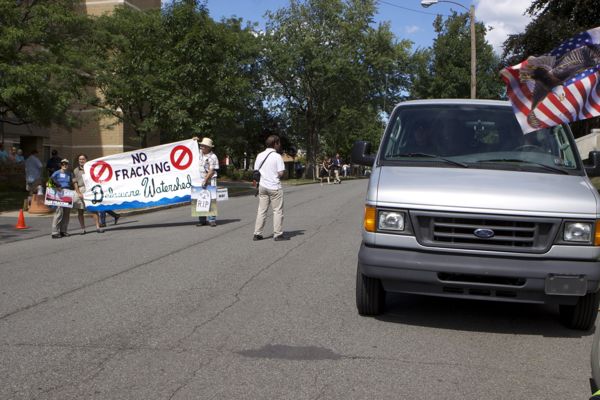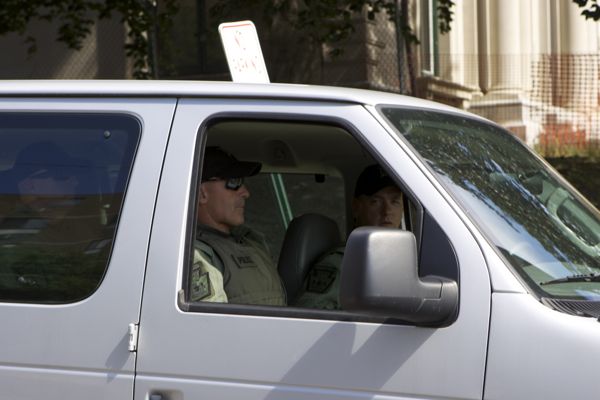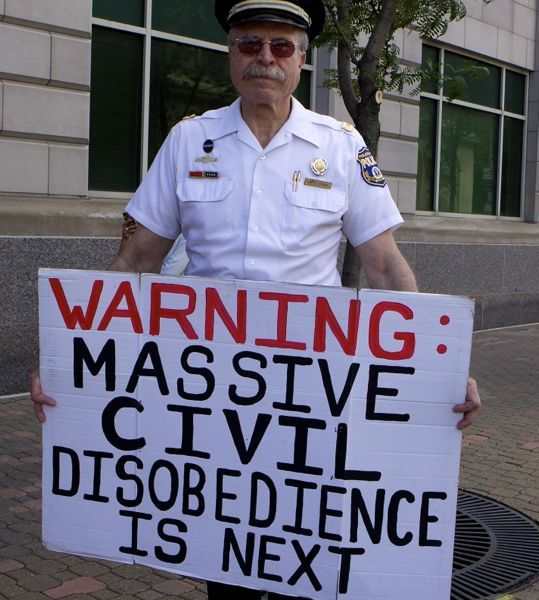Moral Imperative, Institutional Corruption, Democratic Collapse, & Climate Crisis Converge

Who are those men in the unmarked van parked directly across the street from a fracking protest? See photo below
[Update: 1/28/16 – As I was writing this yesterday morning, Gov. Christie BPU was approving another Pinelands gas pipeline, remarkably proving my point that the system is totally corrupt and broken. More to follow, for now, see NJ Spotlight coverage:
I have found an institution I can believe in and trust and whose mission and principles I support wholeheartedly, The Climate Disobedience Center. Let me explain.
Last night, I again heard Tim DeChristopher interviewed on Democracy Now! (you can watch here).
Tim, AKA as “Bidder 70”, founded the center – along with, among others, former NJ PIRG Director Ken Ward.
I’ve followed and have deep respect for both Tim’s work (see Peaceful Uprising) and Ken’s work (Bright Lines).
The Center seems like the perfect and logical outgrowth of that incredible work.
One of my favorite public intellectuals is Chris Hedges, who often writes about the moral imperative to rebel, given that:
1) our democracy and governance structures have been hollowed out and hijacked by corporate interests and are totally ineffective, (Hedges cites the work of recently deceased Princeton political theorist Sheldon Wolin on “inverted totalitarianism“); and
2) the very short timeframe and radical extent of change we must make to avoid irreversible, runaway climate catastrophe (watch fun Tyndall Center video on global carbon budget – and especially the work of Kevin Anderson)
But Hedges’ appeals to rebellion are often abstract and grounded almost exclusively in moral reasoning.
In supporting contrast, the Climate Disobedience Center seems to focus on and support very concrete, actual cases of rebellion and non-violent civil disobedience. The roadmap to implement Hedges’ moral imperatives.
The rationales for rebellion are grounded not only in moral and ethical reasoning, but in science and legal reasoning and pragmatic political organizing.
I love it!
I was particularly interested in this one line of thinking Tim briefly engaged in his interview last night, where, despite interruptions and lame questions from Amy Goodman, he talks abut why he is on this path:
… so we’re going to continue working with the folks who are standing up against it. So, I’m working with them. I’m also working with the Keep It in the Ground campaign that is calling for an end of fossil fuel leasing on public lands. So I’m kind of involved in a lot of different things and trying to remain as independent as possible in the climate movement, because—because it’s such a rapidly shifting crisis.
… So there’s all these different efforts throughout the climate movement trying to approach things in new and creative ways, which I think is necessary—
– when you this, this extremely rapid, rapidly developing crisis that—where we’re up against an opponent, the fossil fuel industry, that is also adapting to what we’re doing. So, you know, I think trying all these new things in a lot of different new ways is critical. And part of the reason that I’m an independent activist is that what we’re seeing is that our institutions have this inertia, whether that’s big climate organizations or, you know, the academic organizations that I’ve spent a couple years with at Harvard Divinity School. They’re not keeping up with the pace of the crisis. They’re not adapting. They get bogged down in this inertia. And so, part of the reason that I’m involved in this film is that it was able to tell the truth in a different way than either of the climate organizations that I’ve been involved with, who are scared to talk about what it means to be too late to stop climate change, or even the academic institutions that I’ve been a part of, that also are—I think, aren’t keeping up with the pace of the crisis.
TIM DECHRISTOPHER: Yeah, and there’s a lot of people working with me on that. And there’s actually a lot of big organizations in the climate movement that have now gotten to that point of challenging—
AMY GOODMAN: What’s the campaign called?
TIM DECHRISTOPHER: —that whole system. It’s called the Keep It in the Ground campaign, with Rainforest Action Network, Center for Biological Diversity, WildEarth Guardians. A lot of big organizations now are challenging that whole system. And they’re trying to move past this sort of one at a time, stop this destructive project, try to fight off that destructive project, and say this whole system is broken. It’s all ignoring this overwhelming threat of climate change, and we need to stop the whole system.
Tim is absolutely correct in his analysis of the institutional flaws, inertia, and lack of creativity, in both the climate/environmental movement and in government. The whole system is broken.
Chris Hedges also writes about how what he calls “demonic institutions” are incapable of truth telling and willing to sell out or even to crush individuals within those institutions who criticize them.
Hedges’ book “The Death of the Liberal Class” provides a scathing historical analysis of the corruption and collapse of liberal institutions – that same critique holds for the environmental movement as a social institution.
I’ve long thought about the interface of these issues and share Tim & Hedges’ views (see Hedges’ Days of Revolt) – that’s one reason I got forced out of DEP and also have tried very hard to remain independent of the environmental movement.
My own experience with the worsening failures of government and the inherent flaws and limitations of the regulatory approach have radicalized my thinking. I now see rebellion, revolt, and direct action non-violent civil disobedience as essential tactics – perhaps our only choice at this juncture.
I am excited by the Center’s mission and urge readers to hit the links – and engage in their own forms of rebellion and disobedience. If not, what’s your threshold for action? (watch this and think about it)



Pingback: WolfeNotes.com » “Moral Imperative” To Fight Climate Change Drove Nuke Bailout
Pingback: WolfeNotes.com » NJ Press Corps Has Always Been Soft On Political Abuses By The NJ State Police